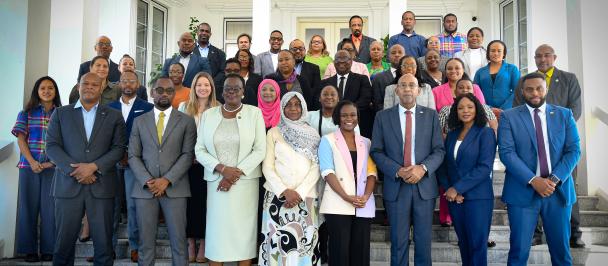UN-Joint Programme Panel Discussion Series gives everyone a seat at the table
For sustainable agriculture to have a chance, silos and uninformed strategies must be set aside and replaced with conversations, open channels of communication and collaboration. This was exactly the purpose of a two-part series of panel discussions coordinated by the United Nations Development Programme (UNDP) as part of the UN joint programme: Building Effective Resilience for Human Security in Caribbean Countries: The Imperative of Gender Equality and Women Empowerment in a Strengthened Agriculture Sector. The series delved into the issues highlighted by a UNDP commissioned Gender Responsive Evaluation of the Impact of Structural Adjustment Programmes and Relevant National Policies on Small Holder Farmers, Fisher-folk and Small Business Entrepreneurs study conducted under the joint programme and examined these issues with the parties most impacted – small farmers especially women, and the government ministers and policy makers responsible for “finding solutions”.
The first virtual Panel Discussion, hosted on the UWI TV platform was held on 25 February with farmers and farming NGOs under the theme: The Human Security Approach and Creating a Conducive Environment for the Development of Small Farmers in the Eastern Caribbean. This dialogue focused on small and women farmers, while discussing practical and innovative solutions to address the challenges outlined above, leading to viable livelihoods for small farmers. This session allowed actual farmers to highlight some of the issues they were facing in real time and provide insights into the type of support they needed from a practical standpoint.
But to effect real change, action is needed. Following on its heels, a little over a month later, the second virtual Panel Discussion on UWI TV was hosted on 8 April 2022. This session built on the inputs of the farming community and provided Ministers in the Agriculture, Gender, Finance and Planning sectors, as well as finance partners with an opportunity to discuss policies and strategies being implemented or in the pipeline, that will impact the ability of the small farming sector and specifically women and youth, to have sustainable livelihoods while contributing to the food security of the region.
These panel discussions offered governments a regional platform to discuss the programmes and policies that they are implementing, taking into consideration the needs of the farmers who through this inclusive dialogue are involved in the solution. What is more, other governments and organisations can learn from the best practices shared by the panel. For Example, the Hon. Virginia Poyotte, of Saint Lucia, spoke on the introduction of gender-responsive national budgeting, planning, implementation, & monitoring and evaluation to promote gender equality as a fundamental human right as well as the keystone of a prosperous, modern economy and highlighted her government’s plans.
Minister Marshall of Antigua and Barbuda indicated that her government is going beyond the usual budgetary requirements for agriculture, supporting eating and buying local and being able to trade within the region. In fact, Minister Marshall indicated that her government intends to surpass the regional target of 25% reduction in imports by 2025
Further to this, while representing Grenada, the Hon. Peter David, discussed the wide and detailed approaches, through a myriad of inclusive consultations, the government of Grenada has taken to address the issue of lack of participation of relevant groups in the agriculture sector. While on the Barbados front, the Hon. Ryan Straughn, spoke on how the Government of Barbados is bolstering the participation of women & youth in agriculture by providing access to land, water, financing & training as well as efforts to transform the sector to build resilience through digitalisation.
As these conversations continue and more persons are invited to the proverbial table, Caribbean countries are on a path to reap a bountiful harvest in the sustainable agricultural arena.

 Locations
Locations




